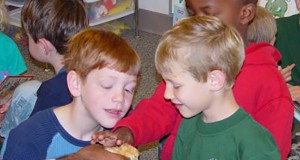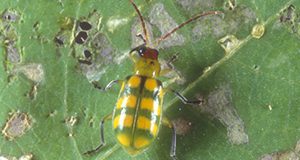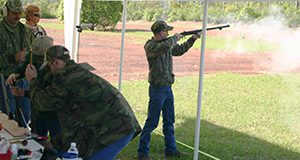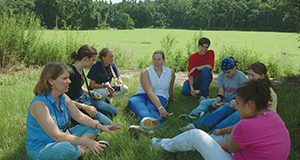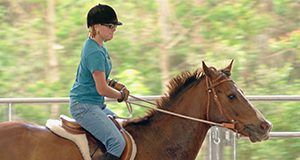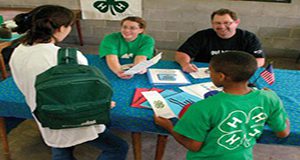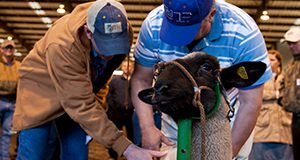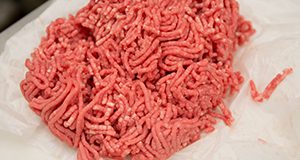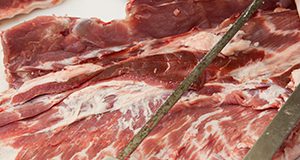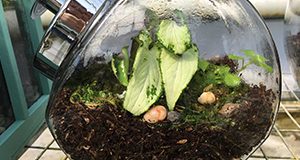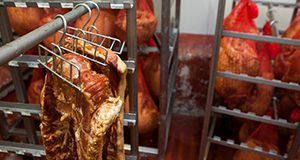School-based programs provide an opportunity to youth who would not be able to participate in traditional 4-H club offerings otherwise. If you want to expand your 4-H program in diversity, subject matter, and/or number of youth reached, school-based programming may be the solution for you. This 6-page document discusses school-based programs, differences between school-based programming and traditional club programming, reasons to start school-based programs, ways to work with school sites, and enrollment for school-based program youth. It is part of the 4-H 101 Fact Sheet series. Written by Vanessa Spero-Swingle and Susan Munyan, and published by the UF/IFAS 4-H Youth Development Department, April 2018.
http://edis.ifas.ufl.edu/4h389
Category: 4-H Youth Development
Florida FFA Vegetable Judging Competition: A Study Guide
This 7-page guide links to articles about insects that are often used in the Florida FFA Vegetable Judging Competition. Written by Jennifer Lynn Gillett-Kaufman, and published by the UF/IFAS 4-H Youth Development Department, April 2018.
http://edis.ifas.ufl.edu/4h388
Risk Management for 4-H Youth Development Work: Risk Management Checklist

This is one publication in the series Risk Management for 4-H Youth Development Work. This series is intended to prepare UF/IFAS Extension county faculty, staff, volunteers, and youth to satisfactorily complete the important task of providing best practices in risk management strategies. This 4-page document provides a checklist that will help during 4-H event and activity planning. Written by Dale Pracht, Paula Davis, Stefanie Prevatt, Janet Psikogios, and Sarah Hensley and published by the UF/IFAS 4-H Youth Development Department, March 2018.
http://edis.ifas.ufl.edu/4h384
Florida 4-H Shooting Sports Level 1 Instructor Training and Certification: Volunteer Leader Training Series
A successful county Shooting Sports program is not possible without screened and trained volunteers to lead clubs. Before instructing youth in any Shooting Sports discipline and/or assisting on the range, a volunteer must meet the Florida 4-H youth protection screening requirements and complete the Florida 4-H Shooting Sports Level 1 Instructor Training. This 3-page fact sheet discusses volunteer recruitment, training, certification in other Shooting Sports disciplines, Level 2 certification, and job duties. Written by Julie P. Dillard, Heather C. Kent, and Julia S. Kelly, and published by the UF/IFAS 4-H Youth Development Department, January 2018.
http://edis.ifas.ufl.edu/4h382
Risk Management for 4-H Youth Development Work: Pre-Event Planning Guide and Matrix
This is the first publication in the Risk Management for 4-H Youth Development Work series. This series is intended to prepare UF/IFAS Extension county faculty, staff, volunteers, and youth for the important task of providing best practices in risk management strategies. This 5-page fact sheet discusses the matrix, levels of risk, probability that something will go wrong, modifications to the event or activity, and post-event assessment. Written by Dale Pracht, Paula Davis, Stefanie Prevatt, Janet Psikogios, Marilyn Norman, Kate Fogarty, and Jean Hink, and published by the UF/IFAS 4-H Youth Development Department, revised March 2018.
http://edis.ifas.ufl.edu/4h299
Risk Management for 4-H Youth Development Work: Records
This 2-page publication is one in the series Risk Management for 4-H Youth Development Work. It discusses the use of records among 4-H participants. Written by Paula Davis, Dale Pracht, Stefanie Prevatt, Janet Psikogios, Marilyn Norman, Kate Fogarty, and Jean Hink and published by the UF/IFAS 4-H Youth Development Department, February 2018.
http://edis.ifas.ufl.edu/4h387
Risk Management for 4-H Youth Development Work: Crisis Management and Emergency Procedures
This 2-page publication is one in the series Risk Management for 4-H Youth Development Work. It focuses on basic overall precautions to be taken by everyone involved with 4-H. Written by Paula Davis, Dale Pracht, Stefanie Prevatt, and Janet Psikogios and published by the UF/IFAS 4-H Youth Development Department, February 2018.
http://edis.ifas.ufl.edu/4h385
Risk Management for 4-H Youth Development Work: Large Animals-Horses
This 13-page publication is one in the series Risk Management for 4-H Youth Development Work. It addresses the risks involving horses at 4-H events. Written by Saundra TenBroeck, Wendy DeVito, Dale Pracht, Chad Carr, Brittani Kirkland, and Georgene Bender and published by the UF/IFAS 4-H Youth Development Department, February 2018.
http://edis.ifas.ufl.edu/4h383
Risk Management for 4-H Youth Development Work: Records and Contracts
This 2-page publication is one in the series Risk Management for 4-H Youth Development. This document will clarify the expectations and procedures for signature authority regarding contracts within UF/IFAS Extension. Written by Stefanie Prevatt, Dale Pracht, Paula Davis, Janet Psikogios, Marilyn Norman, Kate Fogarty, and Jean Hink and published by the UF/IFAS 4-H Youth Development Department, January 2018.
http://edis.ifas.ufl.edu/4h295
Risk Management for 4-H Youth Development Work: Fundraising and Fund Handling
This 6-page document is one in the series Risk Management for 4-H Youth Development Work. It reviews policies and best practices for handling 4-H program funds and conducting 4-H fundraisers. Written by Dale Pracht, Alexandria Pennisi, Paula Davis, Stefanie Prevatt, and Janet Psikogios and published by the UF/IFAS 4-H Youth Development Department, January 2018.
http://edis.ifas.ufl.edu/4h386
Risk Management for 4-H Youth Development Work: Transportation
This 3-page document is one in the series Risk Management for 4-H Youth Development Work. It describes the best practices and procedures for transportation to and from Florida 4-H activities. Written by Stefanie Prevatt, Dale Pracht, Paula Davis, Janet Psikogios, Marilyn Norman, Kate Fogarty, and Jean Hink and published by the UF/IFAS 4-H Youth Development Department, February 2018.
http://edis.ifas.ufl.edu/4h298
Risk Management for 4-H Youth Development Work: Insurance
This 4-page publication is one in the series Risk Management for 4-H Youth Development Work. It reviews policies and best practices for understanding insurance when working with UF/IFAS Extension programs. Written by Stefanie Prevatt, Dale Pracht, Paula Davis, Janet Psikogios, Marilyn Norman, Kate Fogarty, and Jean Hink and published by the UF/IFAS 4-H Youth Development Department, February 2018.
http://edis.ifas.ufl.edu/4h296
Florida 4-H Shotgun Record Book
This 11-page project book discusses goals of the National 4-H Shooting Sports Program and allows 4-H members to record goals and objectives for the year, 4-H Shooting Sports activities, learning experiences, community service, service, learning, and leadership, equipment inventory, finances related to their projects, practice sessions, competitions, and placings in order to help them document their growth, development, and progress. Written by Julie P. Dillard and Gerald Culen, and published by the UF/IFAS 4-H Youth Development Department, November 2017.
http://edis.ifas.ufl.edu/4h378
Lamb and Variety Meat Retail Identification Cuts
This new poster includes all of the lamb and variety meat cuts, primals, and cooking methods that are included in the Florida 4-H Meat Judging Contest. This contest, coordinated by the Florida 4-H Animal Sciences program, develops life skills through activities related to the processing of beef, pork, and lamb, including retail identification, meat quality factors, and cooking methods. Written by Brian Estevez, Chad Carr, and Larry Eubanks, and published by the UF/IFAS 4-H Youth Development Department, December 2017.
http://edis.ifas.ufl.edu/4h381
Beef Retail Identification Cuts
This new poster includes all of the beef cuts, primals, and cooking methods that are included in the Florida 4-H Meat Judging Contest. This contest, coordinated by the Florida 4-H Animal Sciences program, develops life skills through activities related to the processing of beef, pork, and lamb, including retail identification, meat quality factors, and cooking methods. Written by Brian Estevez, Chad Carr, and Larry Eubanks, and published by the UF/IFAS 4-H Youth Development Department, December 2017.
http://edis.ifas.ufl.edu/4h380
Pork Retail Identification Cuts
This new poster includes all of the pork cuts, primals, and cooking methods that are included in the Florida 4-H Meat Judging Contest. This contest, coordinated by the Florida 4-H Animal Sciences program, develops life skills through activities related to the processing of beef, pork, and lamb, including retail identification, meat quality factors, and cooking methods. Written by Brian Estevez, Chad Carr, and Larry Eubanks, and published by the UF/IFAS 4-H Youth Development Department, November 2017.
http://edis.ifas.ufl.edu/4h379
Next Stop: Job!
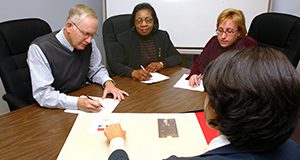 Next Stop: Job is a multi-lesson program designed to teach youth, ages 14 and up, the skills necessary to obtain a job. Through videos and hands-on activities, youth learn essential job market skills, such as marketing, communication, writing skills, and financial literacy, to help them succeed in the workplace. This 28-page publication discusses cover letters, resumes, interviews, proper attire, and management of earnings. Written by Vanessa Spero-Swingle, Laura Cash, Laura Valencia, Gayle Whitworth, Karen Miliffe, and Shane Michael, and published by the UF/IFAS 4-H Youth Development Department, June 2017.
Next Stop: Job is a multi-lesson program designed to teach youth, ages 14 and up, the skills necessary to obtain a job. Through videos and hands-on activities, youth learn essential job market skills, such as marketing, communication, writing skills, and financial literacy, to help them succeed in the workplace. This 28-page publication discusses cover letters, resumes, interviews, proper attire, and management of earnings. Written by Vanessa Spero-Swingle, Laura Cash, Laura Valencia, Gayle Whitworth, Karen Miliffe, and Shane Michael, and published by the UF/IFAS 4-H Youth Development Department, June 2017.
http://edis.ifas.ufl.edu/4h377
Plants and Youth: Designing and Building a Terrarium
A terrarium is a collection of small plants growing in a clear, usually enclosed, container. This three-page fact sheet walks you through the process of creating your own terrarium. Written by Amy Vu and Sydney Park Brown, and published by the Environmental Horticulture Department.
http://edis.ifas.ufl.edu/mg356
Florida 4-H Tailgate: Smoking and Slow Cooking Meat
The Florida 4-H Poultry BBQ program has existed for years, and the program for red meat cookery has been a huge success in Tennessee 4-H. With sponsorship for the winners at the state level, the Florida 4-H Tailgate Contest program will be a success in Florida as well. This program will strive to promote enjoyable outdoor cooking experiences, encourage the incorporation of animal protein in the diet in order to combat childhood obesity, improve youth nutritional knowledge and cooking skills, and impart knowledge about safe handling and proper degree of doneness to produce safe and delicious meat dishes. This 2-page fact sheet is the fourth publication in the Florida 4-H Tailgate series, and it discusses smoking and slow cooking meat. Written by Chad Carr, Brian Estevez, Sonja Crawford, Jason Scheffler, George Baker, Ed Jennings, and Mark Mauldin, and published by the 4-H Youth Development Department, December 2016.
http://edis.ifas.ufl.edu/4h375
Florida 4-H Tailgate: Fire-Building
The Florida 4-H Poultry BBQ program has existed for years, and the program for red meat cookery has been a huge success in Tennessee 4-H. With sponsorship for the winners at the state level, the Florida 4-H Tailgate Contest program will be a success in Florida as well. This program will strive to promote enjoyable outdoor cooking experiences, encourage the incorporation of animal protein in the diet in order to combat childhood obesity, improve youth nutritional knowledge and cooking skills, and impart knowledge about safe handling and proper degree of doneness to produce safe and delicious meat dishes. This 2-page fact sheet is the third publication in the Florida 4-H Tailgate series, and it discusses fire-building. Written by Chad Carr, Brian Estevez, Sonja Crawford, Jason Scheffler, George Baker, Ed Jennings, and Mark Mauldin, and published by the 4-H Youth Development Department, December 2016.
http://edis.ifas.ufl.edu/4h374
